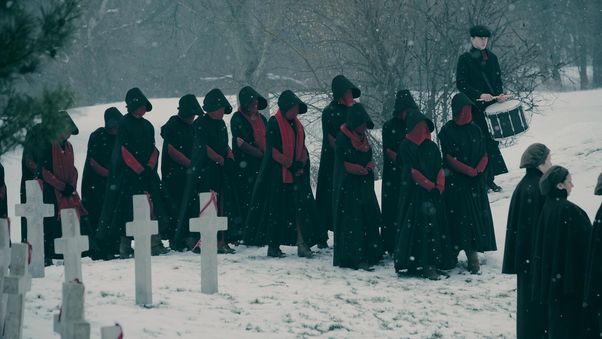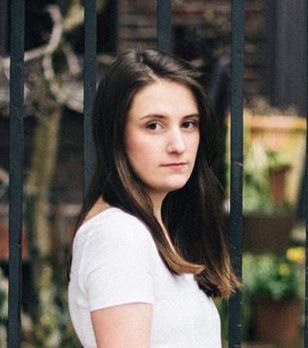Season 2 of The Handmaid’s Tale has begun airing, and it pulls no punches. Within the first few seconds we’re confronted with compelling, yet horrifying viewing. But with some unsettling parallels in Western society today, is Atwood’s dystopian world now a little too close for comfort?
The show, based on Margaret Atwood’s novel of the same name, depicts a nightmarish near-future: a theocratic dictatorship has seized power in America following a terror attack and fertile women are forced into reproductive slavery for a barren elite.
With the writer’s blessing, the show has now moved beyond the ending to the novel and will dive deeper into the layers of society that make up the ‘Republic of Gilead’, as well as developing the characters’ backstories. But does the show really have anything to do with today’s society?
Unsettling Parallels for Our Rights
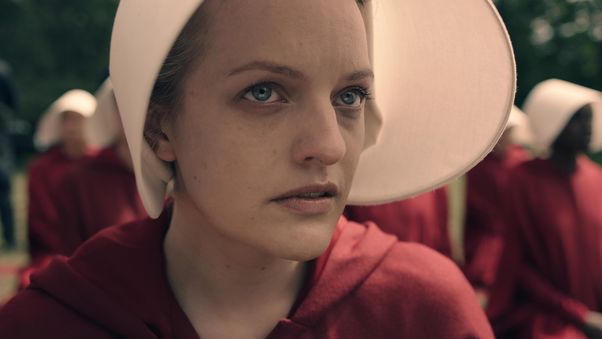
Image: Channel 4 Press Pack / The Handmaid’s Tale
When the series first hit our screens last year, we wrote about how the first season depicted a terrifying world where human rights have been progressively removed. Rights, or the lack of them, are at the heart of the story, with flashbacks showing how a gradual erosion can lead to a terrifying outcome.
Season 2 is airing nearly a year on, and what a year it’s been. An anti-abortion President remains in the White House, the #MeToo movement has revealed the crippling extent of sexual violence suffered by women on a daily basis, and we’ve seen increasing numbers of mass shootings and the ongoing militarisation of American society.
This time round, the nightmarish world of Gilead seems even more eerily relevant to our own.
‘It Doesn’t Include Anything Human Beings Had Not Already Done’
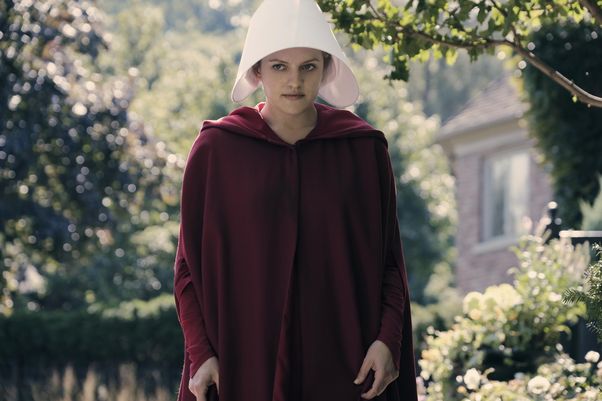
Image: Channel 4 Press Pack / The Handmaid’s Tale
Atwood wrote the book in 1985 and was influenced by the politics of the time, with the election of conservative Republican Ronald Reagan and the increasing power of the Christian right. The writer has famously said that the novel did “not include anything that human beings had not already done in some other place or time, or for which the technology did not already exist”. It is this that gives the book, and the show, such menace; the feeling that this could happen in our own time.
The group-activated hangings, the tearing apart of human beings, the clothing specific to castes and classes, the forced childbearing, the children stolen by regimes and placed for upbringing with high-ranking officials… All had precedents.
Margaret Attwood
The TV show, with its passing references to Tinder and wider representation of race, has updated the novel’s cultural framework, but Atwood’s comment holds true. Writing in the Guardian, she pointed out: “The group-activated hangings, the tearing apart of human beings, the clothing specific to castes and classes, the forced childbearing, the children stolen by regimes and placed for upbringing with high-ranking officials… All had precedents.”
Atwood’s point is that this dark side of humanity, the base cruelty of which humans are capable, is not as far from the surface as we would like to imagine. What The Handmaid’s Tale does so compellingly, through flashbacks, is to depict how the removal of rights can begin gradually, as creeping changes that lead to a new normal. It is about, as James Poniewozki put it, “the way people will themselves to believe the abnormal is normal, until one day they look around and realize that these are the bad old days.”
The flashbacks bring into sharp relief the shocking outcome of the erosion of rights, cutting between scenes of normalcy such as a family breakfast to scenes of the handmaids being tortured and murdered. But surely this could never happen in the United States or the UK today?
A Mirror To Our Own Society?
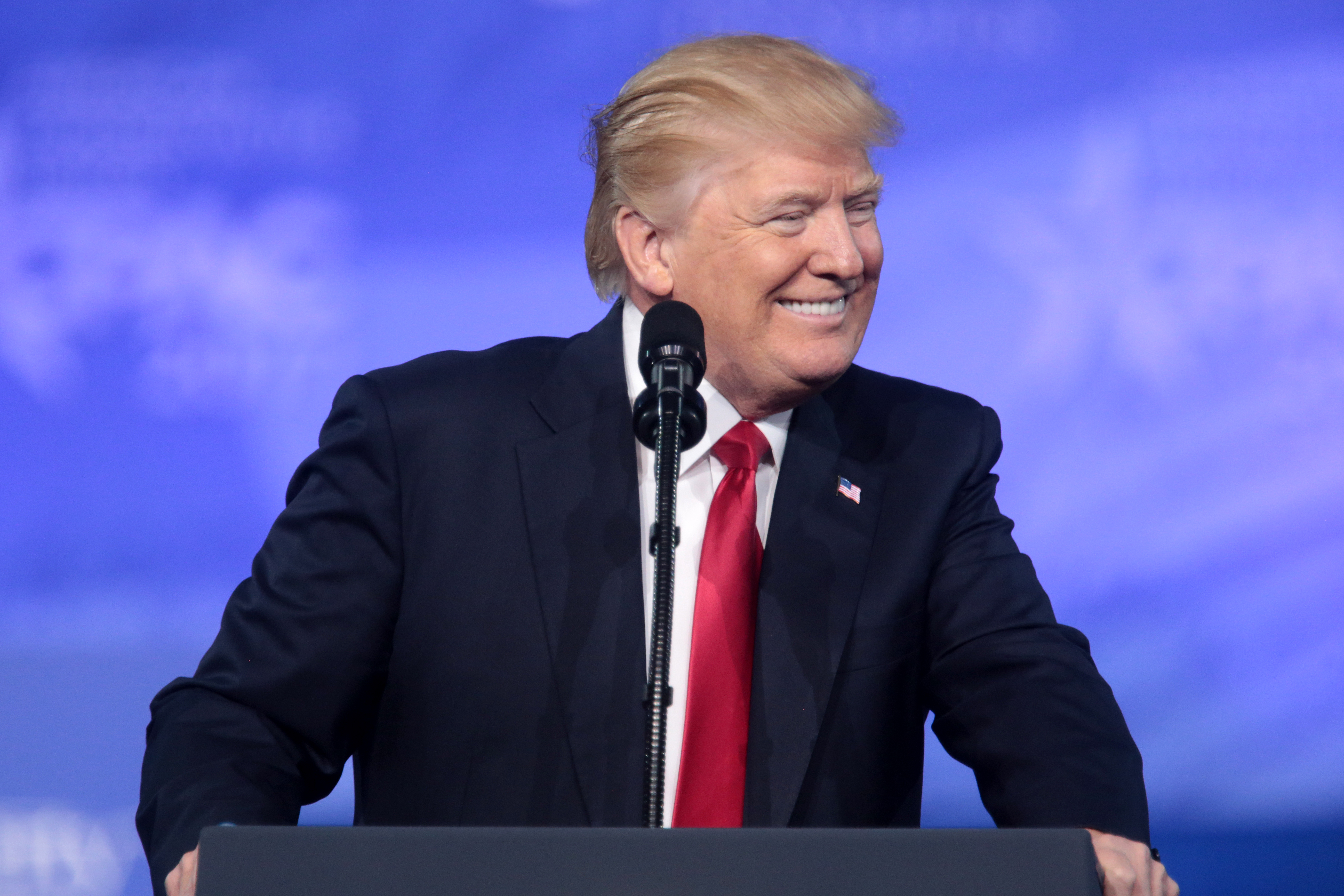
Donald Trump. Image Credit: Wikimedia/Gage Skidmore
Well, as others have pointed out, our own society is not as far away from this dystopia as we might like to think. Some of the first rights women lose in The Handmaid’s Tale are their property rights and right to work. Their bank accounts are taken away and given to their husbands or male relatives; they may no longer work and are confined to life in the domestic sphere.
Despite married women gaining property rights in the UK over a century ago, women today still do the bulk of domestic work. They are more likely to be confined to the private sphere of the home, raising children or in other caring roles. And there is still a significant gender pay gap, which starkly illustrates how male labour today is still valued over female labour.
In another flashback, we see the main character, June, asking her husband to sign a permission slip allowing her to pick up contraception. Women around the world are facing the erosion of their reproductive rights today – who can forget the infamous photograph of Donald Trump, surrounded by men, removing US funding to overseas organisations offering abortion. What’s more, he’s recently moved to defund Planned Parenthood (America’s own family planning service), and some US states have tried to pass laws requiring a woman to have her spouse’s consent before having an abortion.
Whilst we haven’t yet reached the extremes depicted by the show, the anti-abortion stance of much religious conservatism today is arguably based on the same premise as Gilead society: that women should not be allowed to control their own bodies.
Resistance Is Growing
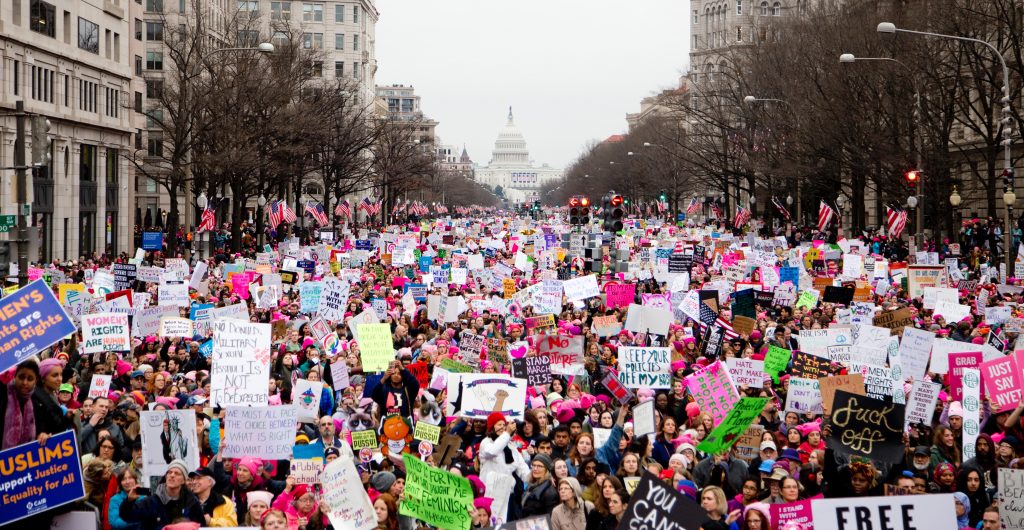
Image Credit: Vlad Tchompalov / Unsplash
With Season 2’s premiere attracting more than double the audience compared to Season 1, it seems more people than ever are aware of these uncomfortable parallels. The show’s lead actress, Elisabeth Moss, who plays June, has herself said, ‘This is happening in your real life. Wake up, people. Wake up.’’
But there are hints that Season 2 may feature more resistance to the regime, and here too there are clear signs that women are more ready than ever to fight for their human rights.
This is happening in your real life. Wake up, people. Wake up.
Elisabeth Moss
With the #MeToo movement, which led to Harvey Weinstein being charged with rape just this week, and the landslide pro-choice victory in the Irish referendum yesterday, now feels like a good time for the fightback to begin.

